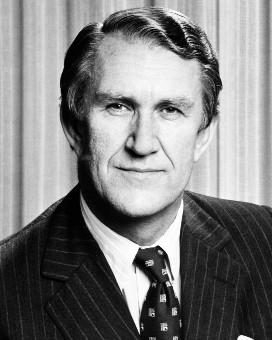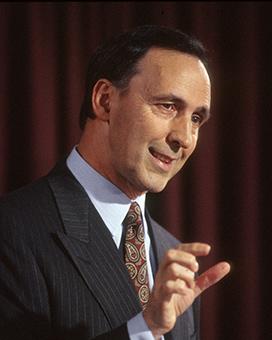On this page
1980 to 1989
18 October 1980: First elected to Federal Parliament
Hawke was elected as Member of Parliament for the seat of Wills (Vic.), in the 19th federal election.
8 Feb 1983: Labor Party leadership
After the resignation of former leader Bill Hayden, Hawke was elected Labor leader and Leader of the Opposition.
11 Mar 1983: 23rd Prime Minister
Hawke was sworn in as prime minister after Labor's landslide victory over Fraser’s Coalition government in the 33rd federal election on 5 March.
11 Apr 1983: Economic summit
In an early example of his consensus approach, Hawke called a meeting of leaders of business, government and trades unions. The meeting discussed economic strategy, the approach to unemployment and inflation, and a prices and incomes accord.
26 Sep 1983: America’s Cup comes to Fremantle
The yacht Australia II won the America’s Cup. It was the 1st challenger to remove the 132-year old trophy from the United States.
9 Dec 1983: Floating the dollar
The Hawke government deregulated the Australian dollar. Instead of the Reserve Bank determining its value, the international money market set the exchange rate.
1 Feb 1984: Medicare
The Medicare health scheme began operating. It replaced the Medibank scheme and was financed by a 1% levy on incomes.
29 Mar 1984: Indigenous promotion
Charles Perkins became the 1st Indigenous person to head a Commonwealth department. He was appointed Secretary of the Department of Aboriginal Affairs.
19 Apr 1984: Let us rejoice
‘Advance Australia Fair’ was proclaimed Australia’s national anthem. This followed 10 years of ongoing debate, a national opinion poll in 1974, and a plebiscite in 1977. At the same time, green and gold were proclaimed Australia’s national colours.
24 Jul 1984: Nuclear tests revisited
The Royal Commission into British Nuclear Tests in Australia was established. It was a response to widespread concern about adequate disposal of radioactive substances, the effects of exposure to ionising radiation, and the impact on traditional owners’ use of their lands. The Commission reported on 5 December 1985.
1 Oct 1984: Handback of Uluru
Governor-General Sir Ninian Stephen formally handed Pitjantjatjara traditional owners the title deeds to the Uluru area. The arrangement required a lease-back to the National Parks and Wildlife Service and joint management by members of the local Mutijulu community and the service.
1 Dec 1984: 34th federal election
Labor under Hawke retained government, although with a reduced majority.
1 Dec 1984: Referendum
Voters rejected 2 proposals, one related to the terms of senators and the other to interchange of powers between the Commonwealth and states.
1 Jan 1985: Espionage records released
The 1954 records of the Royal Commission on Espionage were made public under the new Archives Act 1983. This established the '30-year-rule’ for access to most Commonwealth records.
2 Mar 1986: Australia Acts
Australian law became independent of British parliaments and courts. 7 laws enacted by the states, British government and the final one by the Commonwealth government, severed a constitutional tie to the United Kingdom. The Australia Acts ended the inclusion into Australian law of British Acts of Parliament, and abolished remaining provisions for appeals from Australian courts to the Privy Council in London.
2 Apr 1987: No Australia Card
The Australia Card Bill was rejected by the Senate for the 2nd time and Hawke requested a double-dissolution of parliament. Although the national identity card was a prominent issue in campaigning for the election, it was eventually dropped by the Hawke government.
11 Jul 1987: 35th federal election
Labor under Hawke retained government at this double dissolution election.
30 Nov 1987: Perestroika
Hawke arrived in Moscow on an official visit for discussions on mutual trade and foreign policy. The trip was made possible by post-Cold War changes developed under Soviet President Mikhail Gorbachev.
26 Jan 1988: Bicentenary
Celebrations marked the 200th anniversary of the arrival of the ‘First Fleet’ of British ships into Botany Bay in 1788. Bicentennial events were held throughout the year. Controversy on issues of national identity and Indigenous rights surrounded the events, with more than 40,000 people protesting against the celebrations in Sydney on 26 January.
9 May 1988: New Parliament House
Queen Elizabeth II ceremonially opened Australia’s new Parliament House on Capitol Hill in Canberra, above the provisional Parliament House opened by her parents in 1927. Her grandparents had opened Australia's 1st Parliament in Melbourne, in 1901.
1 Aug 1988: Industrial Relations Act
Enactment of this law provided for the implementation of the government’s industrial relations reforms. It repealed the Conciliation and Arbitration Act 1904 when it came into effect in 1989.
3 Sep 1988: Referendum
None of the 4 proposals put to voters was carried. The proposals related to parliamentary terms, fair and democratic parliamentary elections throughout Australia, giving constitutional recognition to local government, and rights and freedoms.
23 Nov 1988: Questacon
Hawke opened the National Science and Technology Centre, a joint Australia-Japan Bicentennial Project.
16 Feb 1989: 21st Governor-General
William Hayden served as Governor-General until 16 February 1996.
11 Dec 1989: Timor Gap Treaty
Indonesian and Australian representatives signed the Treaty in a plane above the Timor Sea, between East Timor and northern Australia. The Treaty came into force on 9 February 1991. It established a zone of cooperation in an oil-rich undersea area where the continental shelf extending from Java meets the northern Australian continental shelf.
1990 to 1999
5 Mar 1990: ATSIC established
The Aboriginal and Torres Strait Islander Commission began work. It was the result of a merger between the Department of Aboriginal Affairs and the Aboriginal Development Commission.
24 Mar 1990: 36th federal election
Labor under Hawke retained government, despite losing the popular vote.
3 Oct 1990: Fall of the Berlin Wall
Following 6 months of negotiation, East and West Germany were reunified after 45 years. The Berlin Wall, built in 1961 to prevent people leaving Soviet East Germany, was dismantled on 9 November 1989 after the glasnost reforms of Soviet President Gorbachev thawed relations with non-communist countries.
27 Feb 1991: End of the Gulf War
The Iraqi army was defeated after United States (US) ground attacks. These followed Operation Desert Storm, a massive air strike against military targets in Iraq. Australia sent 3 warships to support the US-led United Nations forces in response to the invasion of Kuwait by Iraqi troops in August 1990.
15 Apr 1991: Deaths in custody
The Royal Commission into Aboriginal Deaths in Custody released its final report. The Commission investigated the deaths of 99 Aboriginal prisoners between 1980 and 1989. Its report comprised 11 volumes and over 5000 pages, and included 339 recommendations.
20 Dec 1991: Left office
Facing criticism within the Labor Party, Hawke called a leadership ballot on 19 December and was defeated by Treasurer Paul Keating. Keating was sworn in as prime minister on 20 December.
20 Feb 1992: Left Parliament
2 months after losing his position as prime minister, Hawke resigned from Parliament.
2010 to 2019
16 May 2019: Death
Hawke died at his home, aged 89.





